World

Drone Strike Targets mosque in Sudan
A drone strike hit a Muslim mosque in the Darfur region of Sudan.
According to international media reports, more than 70 people were killed in the attack.
Authorities say the paramilitary group RSF is responsible for the strike, although the group has not yet claimed responsibility.
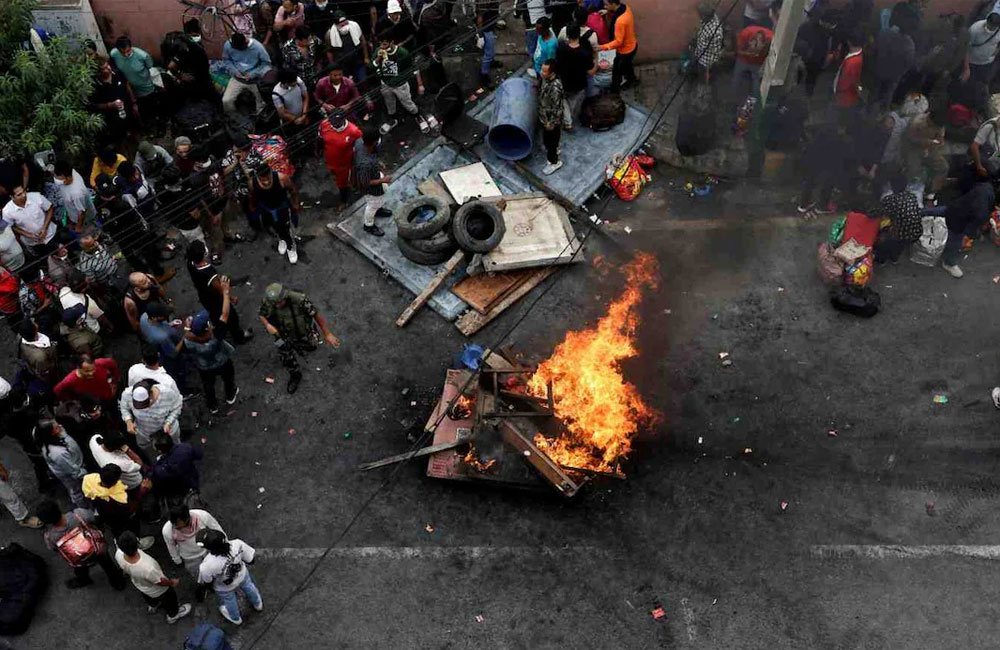
Tourism in Nepal Takes a Hit After the 'Gen-Z' Protest.
Nepal’s tourism industry has suffered a severe setback following the recent wave of protests.
According to international media reports, tourist arrivals have dropped by nearly 30 percent amid the ongoing unrest. The decline is particularly significant as this period normally marks a peak season for visitors, especially those traveling for mountain trekking.
Reports further highlight that in Kathmandu’s bustling Thamel tourist district, shops and restaurants have been left deserted due to the instability.
The violent demonstrations in Nepal have already claimed 72 lives, while more than 2,000 others have been injured.

Leaders of India and Nepal in Conversation
Indian PM Narendra Modi speaks with Nepal’s interim Prime Minister Sushila Karki
Indian media report that Prime Minister Narendra Modi held a phone conversation with Nepal’s interim Prime Minister Sushila Karki. This was their first discussion since Karki took office as Nepal’s interim leader.
During the call, PM Modi expressed his condolences over the recent deaths that occurred amid protests in Nepal.
He also said that India is ready to work to strengthen the special ties between the two countries. Modi assured full support from India to restore peace and stability in Nepal and to help the Nepali people’s progress.
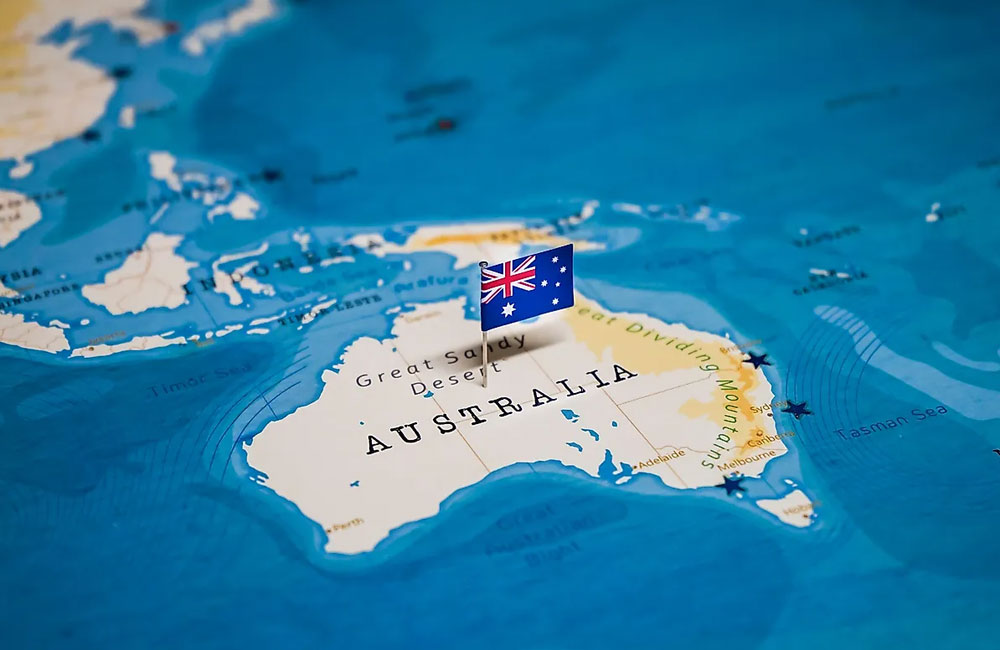
1.5 Million Australians Face Threat
A report has revealed that by the year 2050, 1.5 million people living in coastal areas of Australia will be exposed to the impacts of rising sea levels.
Australia’s National Climate Risk Assessment indicates that due to climate change, Australians face a persistent risk of being affected by natural disasters such as floods, cyclones, heavy rainfall, and bushfires.
Commenting on the matter, Australia’s Minister for Climate Change, Chris Bowen, stated that Australians are already confronting these climate-related hazards, and that necessary measures must be taken to minimize the impacts in the future.
The report further highlights that the average temperature in Australia has already risen by 1.5 degrees Celsius, and if this trend continues, the number of deaths caused by heat-related events could increase by up to 400 percent.
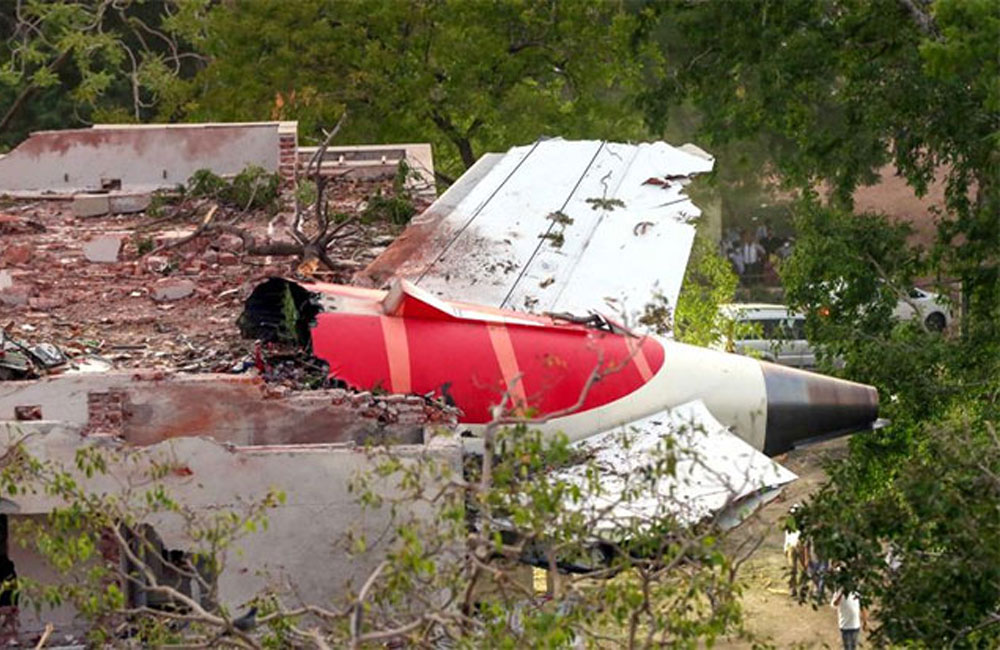
Air India crash victims’ families sue aerospace firms Boeing and Honeywell
The families of four passengers who died on an Air India jet that crashed in June have filed a lawsuit in the US against planemaker Boeing and aircraft parts maker Honeywell, accusing the companies of negligence.
The lawsuit filed Tuesday, and seen by the BBC, said faulty fuel switches caused the accident and accused the companies of doing “nothing” despite being aware of the risks of the aircraft’s design.
Air India Flight 171 bound for London Gatwick, a Boeing 787, crashed shortly after takeoff from Ahmedabad, killing 260 people.
Fuel switches have become a focus for investigators after a preliminary inquiry found that fuel to the engines was cut off moments after the plane left the ground.
The US Federal Aviation Administration (FAA) has said earlier that fuel control switches in Boeing aeroplanes are safe.
The BBC has contacted Boeing and Honeywell for a response.
The US plane manufacturer did not comment on the case. Instead it pointed to India’s Aircraft Accident Investigation Bureau’s (AAIB) preliminary investigation report into the crash.
The lawsuit alleges that both firms knew about the risk of a crash since they developed and marketed the 787 Dreamliner and its components.
It cited a 2018 FAA advisory that urged - but did not mandate - operators to inspect the fuel switches’ locking mechanism to ensure that it could not be accidentally moved, thereby cutting off fuel supply.
In the case of Air India Flight 171, the switch was moved from “run” to the “cut-off” position, hampering the thrust of the plane, according to the AAIB’s preliminary investigation report.
The families said this amounted to a design “defect” that “allowed for inadvertent cutoff of fuel supply and total loss of thrust necessary to propel” the plane.
They said: “And what did Honeywell and Boeing do to prevent the inevitable catastrophe? Nothing.”
The companies also failed to warn airlines that the switches required inspection and repair, and did not supply replacement parts to enable its customers to install them, according to the lawsuit.
Boeing and Honeywell “sat idly” behind a gentle advisory that merely recommended inspecting the switches, said the families, who are represented by Texas-based Lanier Law Firm.
A more detailed report of the crash is expected sometime in 2026.
A total of 229 passengers, 12 cabin crew and 19 people on the ground perished when the plane crashed.
Source: BBC
- Agencies

Owen Cooper Becomes Youngest Actor to Win an Emmy
Owen Cooper has become the youngest actor to win an award at the Emmy Awards held in the United States.
He received this award for his performance in the television series Adolescents.
According to international media reports, Owen Cooper is currently 15 years old.
Meanwhile, at the same Emmy Awards ceremony, Seth Rogen won the award for Outstanding Lead Actor in a Comedy Series, while Jean Smart was honored as the Outstanding Lead Actress in a Comedy Series.

Brigitte Macron Ready to Prove She Is a Woman
Foreign media report that Brigitte Macron, the wife of French President Emmanuel Macron, is reportedly preparing to present photographs and scientific evidence to prove her gender identity as a woman.
The allegations arose after American political commentator Candace Owens claimed that Brigitte Macron, the French first lady, was born male.
In response, French President Emmanuel Macron and his wife, Brigitte Macron, have taken legal action in a U.S. court against Owens.
Their lawyer, Tom Clare, told the media that such defamatory statements affect not only anyone with a professional or family life but also President Macron in his capacity as the head of state.
He further stated that scientific expert evidence will be presented in due course and that the couple is fully prepared to demonstrate that the allegations are entirely false.
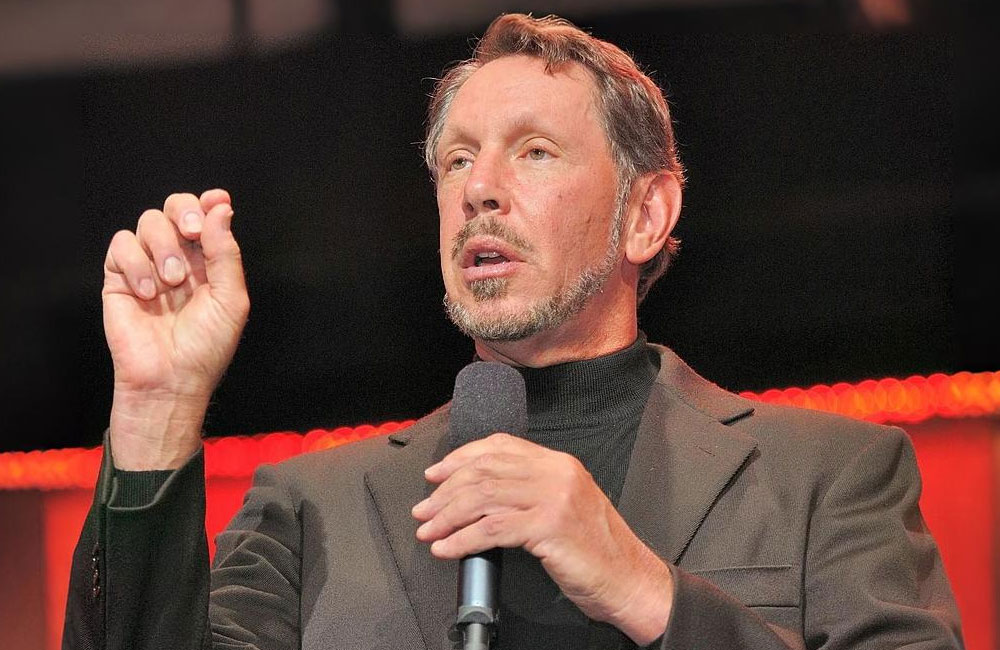
Larry Ellison Briefly Surpasses Elon Musk as World’s Richest Man
Oracle co-founder Larry Ellison briefly overtook Elon Musk as the world’s richest person this week, after Oracle’s shares jumped more than 40% on strong forecasts for its cloud and AI business. His fortune hit $393 billion, edging past Musk’s $385 billion, according to Forbes. By the end of the day, however, a dip in Oracle’s stock put Musk back on top.
Musk, who has held the top spot for nearly a year, faces challenges as Tesla shares slide amid political backlash and reduced US support for electric vehicles. Still, he could receive a pay package worth $1 trillion if ambitious targets are met.
Ellison, 81, has expanded his influence beyond software, aligning closely with President Trump. He has backed Project Stargate, a US-based AI initiative, and Oracle has been floated as a potential buyer for TikTok, which faces a possible US ban. Recently, Ellison also helped finance his son David’s $8 billion takeover of Paramount Global, adding media ambitions to his growing empire.

India joins Belarus-Russia war games amid trade tensions with US
Indian troops have participated in the Russian-led Zapad-2025 military drills, Russian state agency TASS said on Tuesday, highlighting Moscow’s close ties with New Delhi, whose growing ties with the United States have been strained by the imposition of hefty tariffs by President Donald Trump.
The Indian Ministry of Defence confirmed that it had sent 65 armed forces personnel to participate in the five-day military exercise, a theatrical demonstration of firepower conducted jointly by Russia and Belarus to test their combat readiness in the event of an invasion.
The manoeuvres, which featured 100,000 troops in a display of might that included nuclear-capable bombers and warships, took place at a time of heightened tension with NATO countries, coming just days after the downing of Russian drones in Poland last week.
“Today we are conducting the final part of the Zapad 2025 strategic exercise,” said Putin, wearing a military uniform.
India was not the only foreign power involved, with “task forces and military contingents” from Iran, Bangladesh, Burkina Faso, Democratic Republic of the Congo (DRC) and Mali also joining in, TASS reported, citing the Kremlin.
But India’s participation, led by a battalion of the highly respected Kumaon Regiment and aimed at strengthening “the spirit of cooperation and mutual trust” with Russia, will have raised eyebrows amid signs that the US may be losing a key ally in Asia, seen as an important counterweight to China.
Strains emerged between the two countries last month after the Trump administration imposed 50 percent tariffs on Indian imports, accusing New Delhi of fuelling Moscow’s deadly attacks on Ukraine with its purchases of Russian oil.
Earlier this month, Trump seemed to confirm the rift, posting on social media that both India and Russia appeared to have been “lost” to “deepest, darkest China” as the three countries cozied up at the Shanghai Cooperation Organisation (SCO) summit in Tianjin.
India-US ties back on track?
But last week, Trump announced on X that India and the US are continuing negotiations to address trade barriers between the two nations. He previously accused India of imposing high tariffs on US goods.
Indian Prime Minister Narendra Modi responded to Trump’s post on X, saying: “India and the US are close friends and natural partners”.
“I am confident that our trade negotiations will pave the way for unlocking the limitless potential of the India-US partnership,” Modi added.
On Tuesday, Modi thanked Trump for wishing him a happy 75th birthday.
“Thank you, my friend, President Trump, for your phone call and warm greetings on my 75th birthday. Like you, I am also fully committed to taking the India-US Comprehensive and Global Partnership to new heights,” he posted on X.
This is not the first time that India has participated in Russian military exercises. In 2021, shortly before Russia’s full-scale invasion of Ukraine, New Delhi said it sent an unspecified number of troops to Russia’s Volgograd region to join activities linked to “Counter Terrorism and Conventional operations”.
India’s ties with Russia go back to the erstwhile USSR, which provided extensive help to the Indian economy. Throughout the Cold War, India chose to remain non-aligned, but it sourced most of its weapons from the Soviet Union.
New Delhi still buys most of its defence equipment from Moscow, but over the past two decades, it has attempted to diversify its weapons imports.
Iran-Russia continue strategic alignment
Iran also participated in this year’s Zapad, according to the TASS, though the presence of its troops was not confirmed by official channels.
Tehran is known to be a close strategic partner of Russia, supplying it with self-detonating Shahed drones used in the Ukraine war and, according to Western intelligence sources, ballistic missiles.
This year, the two countries signed a “comprehensive strategic partnership treaty”, deepening their relationship on military and other fronts.
Tehran and Moscow launched a joint military drill in the Caspian Sea after Israel launched bombings of Iran, leading to 12 days of war. The US also joined the war after targeting an Iranian nuclear site with bunker buster bombs.
On Tuesday, the US confirmed that its military officials observed the military drills the previous day after accepting an invitation to the event.
The US presence on the sidelines comes as it tries to wrestle Russia into bringing its war in Ukraine to an end, while seeking closer ties with Belarus.
(lankaleader.lk)

More Children Now Struggle with Obesity than Hunger, UNICEF Warns
A new UNICEF report reveals that more school-age children and adolescents are now obese than underweight, with 188 million young people affected globally. Obesity now surpasses underweight in almost all regions except sub-Saharan Africa and South Asia.
Over the past 25 years, the number of overweight children has doubled from 194 million to 391 million, with a large portion classified as obese. The highest obesity rates are found in Pacific Island nations like Niue (38%), the Cook Islands (37%), and Nauru (33%). High-income countries also show significant levels, including Chile (27%) and the United States and UAE (21%).
UNICEF warns that obesity is a serious health risk, leading to conditions such as type 2 diabetes, high blood pressure, heart disease, and even cancer. Poor diets, particularly high consumption of ultra-processed foods, are a major contributor.
The report also highlights socioeconomic differences: in high-income countries, obesity is more common among poorer children, while in low-income countries, wealthier children are more at risk due to access to energy-dense foods. In middle-income countries, obesity affects children across all income groups.
While the prevalence of underweight children aged 5-19 has declined from 13% in 2000 to 9.2%, undernutrition remains a major concern for children under five, particularly in low- and middle-income countries.
UNICEF emphasizes that malnutrition now includes both underweight and obesity, and addressing unhealthy diets is critical for children’s growth, development, and long-term health.

Israel Carries Out Long-Planned Attack on Gaza City
Israel has launched a major ground assault on Gaza City, an operation reportedly planned for some time.
According to foreign media reports, the offensive was accompanied by heavy airstrikes carried out late last night (16).
Hamas stated that in the past 24 hours alone, Israeli attacks have killed 59 people and injured at least 386 others.
Israeli Prime Minister Benjamin Netanyahu announced that the operation was being conducted against what he described as Hamas’ last major stronghold, despite mounting criticism from the United Kingdom and other nations.
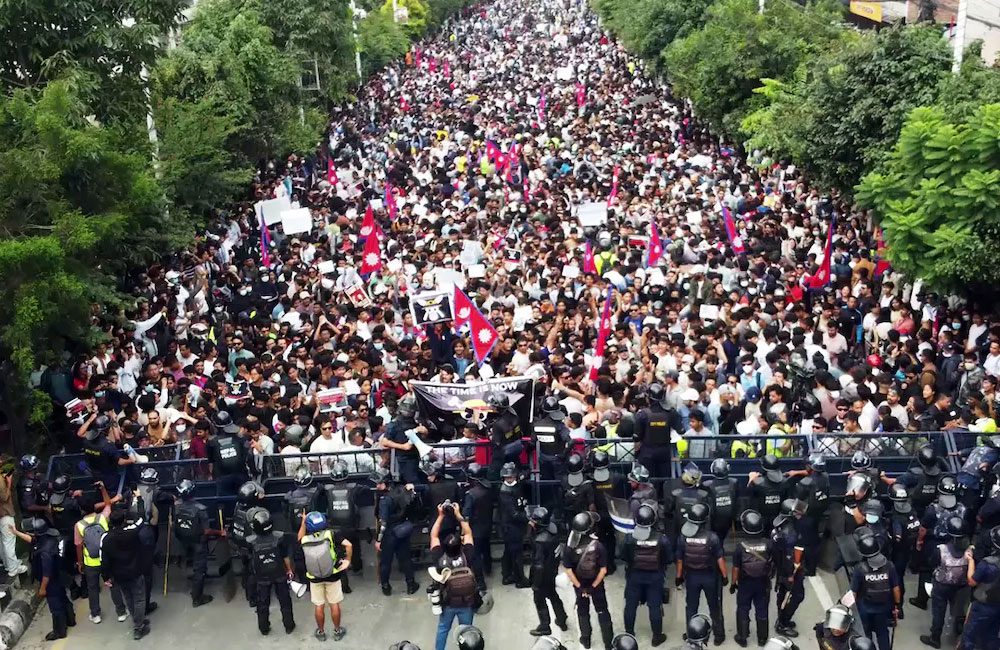
900 Prisoners Escape Amid Escalating Protests
Foreign media report that amid escalating protests, approximately 900 prisoners have escaped from two prisons in western Nepal.
Meanwhile, in response to the unrest, Nepal’s security forces, including the military, have been tasked with maintaining law and order. Following widespread protests that resulted in multiple fatalities, Nepal’s Prime Minister KP Sharma Oli resigned from his position.
During the protests, which continued despite the imposition of curfews, several high-profile locations were set on fire, including Prime Minister Oli’s residence, President Ram Chandra Poudel’s residence, the offices of the ruling Nepali Congress Party, and the homes of other political figures.
Subsequently, protesters also attempted to set fire to the Nepalese Parliament complex and the Supreme Court. Social media reports indicate that Finance Minister, former Prime Minister Sher Bahadur Deuba, and his wife, the current Foreign Minister, were reportedly attacked by demonstrators.
Other locations affected included the Singha Durbar building in Kathmandu, several hotels, media institutions, and the airport.
Amid the ongoing unrest, the Nepalese military has assumed control of governance in affected areas and has intervened to manage the violent activities. The military chief has appealed to the public to act calmly.
The military has also reported that certain groups have exploited the crisis to engage in looting, arson, property destruction, and even attempted sexual assaults.
The protests began primarily in response to the government’s decision to block 26 social media platforms in Nepal. A large portion of the demonstrators are young people from the new generation.
Following these unfortunate events, the Nepalese government restored access to all social media platforms. However, the protesters, expressing strong anger against the government, continued their demonstrations, contributing to the ongoing unrest.
Page 9 of 51